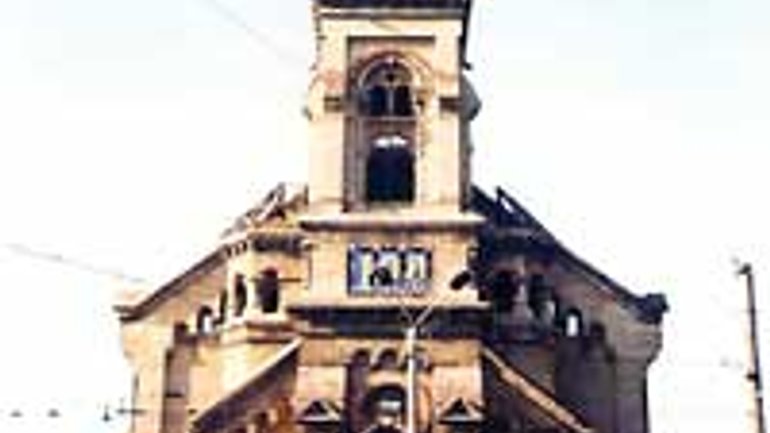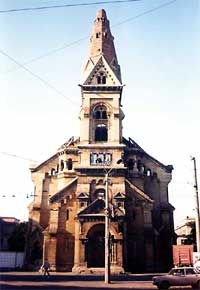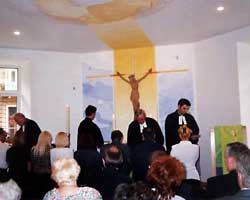Interview with Dr. Edmund Ratz

"We are all Christians, we have one Bible and one Jesus Christ"
Interview with Dr. Edmund Ratz, bishop of the German Evangelical Lutheran Church of Ukraine
 In the old German neighborhood in the center of Odesa one can still see a halfruined but, nevertheless, majestic kirche (German for "church") of the German Evangelical Lutheran Church of Ukraine. Its beauty attracts many residents of Odesa and visitors. All possible measures are currently being taken to restore it. The church community has already repaired one of the former pastoral buildings, St. Paul's Church House.
In the old German neighborhood in the center of Odesa one can still see a halfruined but, nevertheless, majestic kirche (German for "church") of the German Evangelical Lutheran Church of Ukraine. Its beauty attracts many residents of Odesa and visitors. All possible measures are currently being taken to restore it. The church community has already repaired one of the former pastoral buildings, St. Paul's Church House.
– Please tell us about the history of the Odesa community of the German Evangelical Lutheran Church of Ukraine.
– The German Evangelical Lutheran Church of Ukraine has been in Odesa for 200 years. The first German evangelical pastor was invited to Odesa by the Duke of Richelieu in 1803 and started his work in September that year. At the same time a Roman Catholic spiritual representative was summoned to Odesa.
The pastor's role was to care for German colonists and settlers and to form a church community. The Odesa community also became a center for Germans living near the city. In just 20 years the community built the kirche, which still survives and adorns the central part of Odesa. The pastor's house, a guest house, orphanage, German school, and residential buildings were also built at that time. In 1914, before World War I, the community had 10,000 members. They were mostly merchants, but also some university staff. Community life ceased under communist rule.
– The kirche, apparently, was also closed down under communist rule, wasn't it?
– The kirche was closed in the 1930s. The cross from its steeple was removed and dynamited. Theophil Richter, the father of Sviatoslav Richter (whose memorial plaque you can see on the building of our present church center), worked in this church. He was executed by the authorities, and Sviatoslav Richter later moved to Moscow and became famous all over the world.
 The communities were revived with the beginning of "Perestroika." People got together and established an organization, "Revival," that gave rise to the creation of new communities. Then the state gave back these buildings to us. They were in extremely bad condition. However, we put them in order and can now work there. We have an office and facilities for community activities and prayer.
The communities were revived with the beginning of "Perestroika." People got together and established an organization, "Revival," that gave rise to the creation of new communities. Then the state gave back these buildings to us. They were in extremely bad condition. However, we put them in order and can now work there. We have an office and facilities for community activities and prayer.
Our Odesa community has 400 members today. There are 40 communities of the German Evangelical Lutheran Church in Ukraine.
By the way, there are still many people in Odesa who can still remember the life of our communities and churches before the communist prohibitions.
– How did the church building survive, despite the fact that it had been closed in the 1930s?
– I can only tell what I have heard. In the 1930s an Orthodox cathedral was dynamited in Odesa. I heard that the kirche was also to be dynamited. But its building was very beautiful, and there was a nice organ there. I heard that the people who came to blast it met with the resistance of students. These young people did everything possible to rescue the temple from destruction.
Then came the RomanianGerman occupation of Odesa. From 1941 to 1944, the kirche was open for prayers again. But when the Red Army returned, it was closed down and used as a gymnasium. It was to be rebuilt and turned into a culture house. In 1978 it was set on fire several times, and its interior was completely destroyed.
– Are there any plan to restore the kirche, and are there people who would be willing to donate for this? Many residents of Odesa believe that, without the German kirche, Odesa will not be the place it used to be. It is its calling card.
– I completely agree. We are interested in restoring our temple. The mayor and other important figures are of the same opinion. But the problem is, it is in extremely poor condition. We involved experts to have the condition of the kirche assessed. They said it was 80 % ruined.
We are asking our friends in Germany and other countries. But we do not know if they will help us. Some people say: "The ones who reduced it to this condition should restore it. It should be handled by the state or representatives of the state, who reduced the kirche to the present condition."
We told the mayor of Odesa about it. He said he would try to help as much as possible. The city of Odesa does not have funds to restore the German kirche. We are currently seeking a realistic solution. Perhaps we will restore only part of the church, as it is very large, since it was designed for a community of 10,000 members. We would really welcome any possible support in restoring it. The kirche is very important for Odesa and for us.
– Your present center has a library, you conduct Christian courses, and so on. If approached by a person who seeks God, what can you offer them?
– We have pastors here who would be happy to meet such a person. We can see that people are interested in our activity. They can come to us, and we will talk to them.
– The German Evangelical Lutheran Church of Ukraine in Odesa is a member of the Spiritual Council of Christian Denominations. You were one of the founders of this council. What is the significance of this council, in your opinion?
– I should stress that this activity is absolutely normal and usual for us. We are a worldwide church, like the Roman Catholics are. There are Lutheran churches in Germany, the USA and other countries of the world. We work with other churches in countries where there are Lutherans. Before coming to Odesa I worked in Germany, and in each city we had a council, where we worked together with Roman Catholics, Orthodox, Baptists and others.
When a proposal was put forward to establish a similar spiritual council in Odesa, I said: "Why not?" We are all Christians, we have one Bible and one Jesus Christ. All Christians should live in friendship. We have much in common, and it unites us.
– It is wellknown in Odesa that the German Evangelical Lutheran Church of Ukraine, together with other Christian confessions, also care for seamen, helping in their needs. What are your plans in this regard?
– The Lutheran Church has a long tradition of caring for seamen. I worked with seamen in Britain and provided pastoral care to them for several years. The church tells us to care for seamen among others. We would like to work in this field together with other churches, and we are interested in this cooperation.
Interview conducted in Odesa on 21 March 2003
by Ihor STOLIAROV









